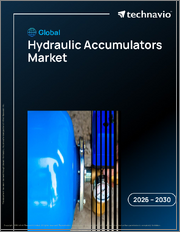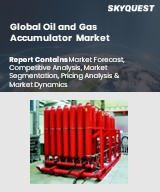
|
시장보고서
상품코드
1570704
어큐뮬레이터 시장 : 제품 유형별, 용도별, 최종 사용자별 - 예측(2025-2030년)Accumulators Market by Product Type (Bladder Accumulators, Diaphragm Accumulators, Piston Accumulators), Application (Automotive Applications, Energy Sector, Industrial Applications), End-User - Global Forecast 2025-2030 |
||||||
어큐뮬레이터 시장은 2023년에 5억 6,154만 달러로 평가되었고, 2024년에는 6억 8,167만 달러로 추정되며, CAGR 26.40%로 성장할 전망이고, 2030년에는 28억 9,476만 달러에 이를 것으로 예측됩니다.
어큐뮬레이터는 유압 및 공압 시스템의 중요한 구성 요소로 널리 인식되고 있으며, 에너지 변동을 관리하고 압력을 안정화시키는 에너지 저장 장치로서 기능하여 시스템의 효율성과 신뢰성을 높입니다. 어큐뮬레이터의 필요성은 에너지를 저장하고, 시스템 충격을 줄이고, 누출을 보정하는 능력에서 왔으며, 자동차, 제조업, 재생 가능 에너지 등의 산업에서 필수적입니다. 광범위한 용도는 유체 시스템 안정화, 재생 가능 부문의 에너지 저장 장치, 자동차 브레이크 시스템의 압력 유지 도구 등에 사용됩니다. 최종 용도의 범위에는 자동차, 항공우주, 산업 제조, 발전 등의 산업이 포함되며 성능 향상과 지속가능성을 위해 어큐뮬레이터에 크게 의존합니다.
| 주요 시장 통계 | |
|---|---|
| 기준년(2023년) | 5억 6,154만 달러 |
| 예측년(2024년) | 6억 8,167만 달러 |
| 예측년(2030년) | 28억 9,476만 달러 |
| CAGR(%) | 26.4% |
시장 인사이트에 따르면 신재생 에너지에 대한 투자 증가와 산업 자동화의 진보가 시장 성장의 주요 촉진요인임이 밝혀졌습니다. 특히 전기자동차와 신재생 에너지 도입의 대두에 맞추어 에너지 효율적인 시스템과 개선된 에너지 저장 솔루션에 대한 수요가 새로운 기회를 창출하고 있습니다. 아시아태평양과 북미와 같이 산업 확대와 기술 혁신에 주력하는 지역은 큰 성장 가능성을 보여줍니다. 그러나 시장은 높은 초기 비용, 유지 보수의 복잡성, 엄격한 품질 기준의 필요성과 같은 과제에 직면하고 있습니다.
에너지 밀도 향상, IoT와 AI 기능을 통합한 스마트 어큐뮬레이터 기술 개발, 환경적으로 지속가능한 재료 개량 등 혁신적인 개발이 기대되고 있습니다. 기업은 에너지 손실을 줄이고 라이프사이클 효율을 높이기 위한 재료의 발전을 목표로 하는 연구에 주력해야 합니다. 이러한 혁신은 성장의 길을 열고 동시에 한계를 해결할 수 있습니다. 게다가 전략적 파트너십과 연구개발 투자는 스마트 그리드 시스템과 가변 신재생 에너지 통합의 새로운 기회를 활용할 수 있는 길을 시장 리더에게 개방할 수 있습니다. 이러한 전망이 있음에도 불구하고, 기업은 다양한 부문에 걸친 어큐뮬레이터 용도의 잠재력을 극대화하기 위해 규제 준수, 비용 관리 및 기술적 적응을 극복해야 합니다.
시장 역학 : 빠르게 진화하는 어큐뮬레이터 시장의 주요 시장 인사이트 공개
어큐뮬레이터 시장은 수요 및 공급의 역동적인 상호작용에 의해 변모하고 있습니다. 이러한 시장 역학의 진화를 이해함으로써 기업은 충분한 정보를 바탕으로 투자결정, 전략적 결정 정밀화, 새로운 비즈니스 기회 획득에 대비할 수 있습니다. 이러한 동향을 종합적으로 파악함으로써 기업은 정치적, 지리적, 기술적, 사회적, 경제적 영역에 걸친 다양한 리스크를 경감할 수 있어 소비자 행동이나 그것이 제조 비용 및 구매 추세에 미치는 영향에 대해서도 더 명확하게 이해할 수 있습니다.
Porter's Five Forces : 어큐뮬레이터 시장을 탐색하는 전략 도구
Porter's Five Forces 프레임 워크는 시장 상황경쟁 구도를 이해하는 중요한 도구입니다. Porter's Five Forces 프레임 워크는 기업의 경쟁을 평가하고 전략적 기회를 탐구하는 명확한 기술을 설명합니다. 이 프레임 워크는 기업이 시장 내 세력도를 평가하고 신규 사업의 수익성을 결정하는 데 도움이 됩니다. 이러한 인사이트를 통해 기업은 자사의 강점을 활용하고 약점을 해결하고 잠재적인 과제를 피할 수 있으며 보다 강인한 시장에서의 포지셔닝을 확보할 수 있습니다.
PESTLE 분석 : 어큐뮬레이터 시장에서 외부로부터의 영향 파악
외부 거시 환경 요인은 어큐뮬레이터 시장의 성과 역학을 형성하는데 매우 중요한 역할을 합니다. 정치적, 경제적, 사회적, 기술적, 법적, 환경적 요인 분석은 이러한 영향을 탐색하는 데 필요한 정보를 설명합니다. PESTLE 요인을 조사함으로써 기업은 잠재적인 위험과 기회를 더 잘 이해할 수 있습니다. 이 분석을 통해 기업은 규제, 소비자 선호, 경제 동향의 변화를 예측하고 앞으로 예상되는 적극적인 의사 결정을 할 준비를 할 수 있습니다.
시장 점유율 분석 : 어큐뮬레이터 시장에서 경쟁 구도 파악
어큐뮬레이터 시장의 상세한 시장 점유율 분석을 통해 공급업체의 성과를 종합적으로 평가할 수 있습니다. 기업은 수익, 고객 기반, 성장률 등 주요 지표를 비교하여 경쟁 포지셔닝을 밝힐 수 있습니다. 이 분석을 통해 시장 집중, 세분화 및 통합 동향을 밝혀내고 공급업체는 경쟁이 치열해짐에 따라 자사의 지위를 높이는 전략적 의사 결정을 내리는 데 필요한 지식을 얻을 수 있습니다.
FPNV 포지셔닝 매트릭스 : 어큐뮬레이터 시장에서 공급업체의 성능 평가
FPNV 포지셔닝 매트릭스는 어큐뮬레이터 시장에서 공급업체를 평가하는 중요한 도구입니다. 이 행렬을 통해 비즈니스 조직은 공급업체의 비즈니스 전략과 제품 만족도를 기준으로 평가하여 목표에 맞는 충분한 정보를 바탕으로 의사 결정을 내릴 수 있습니다. 네 가지 사분면을 통해 공급업체를 명확하고 정확하게 부문화하고 전략 목표에 가장 적합한 파트너 및 솔루션을 파악할 수 있습니다.
전략 분석 및 추천 : 어큐뮬레이터 시장에서 성공을 위한 길 그리기
어큐뮬레이터 시장의 전략 분석은 세계 시장에서의 존재를 강화하려는 기업에 필수적입니다. 주요 자원, 역량 및 성과 지표를 검토함으로써 기업은 성장 기회를 파악하고 개선을 위해 노력할 수 있습니다. 이 접근법을 통해 경쟁 구도에서 과제를 극복하고 새로운 비즈니스 기회를 활용하여 장기적인 성공을 거둘 수 있는 체제를 마련할 수 있습니다.
이 보고서는 주요 관심 분야를 포괄하는 종합적인 시장 분석을 제공합니다.
1. 시장 침투 : 업계 주요 기업의 광범위한 데이터를 포함한 현재 시장 환경의 상세한 검토, 시장 도달 및 전반적인 영향력을 평가합니다.
2. 시장 개척도 : 신흥 시장의 성장 기회를 파악하고, 기존 부문에서의 확장 가능성을 평가하며, 미래 성장을 위한 전략적 로드맵을 설명합니다.
3. 시장 다양화 : 최근 제품 출시, 미개척 지역, 업계의 주요 진보, 시장을 형성하는 전략적 투자를 분석합니다.
4. 경쟁 평가 및 정보 : 경쟁 구도를 철저히 분석하고 시장 점유율, 사업 전략, 제품 포트폴리오, 인증, 규제 당국 승인, 특허 동향, 주요 기업의 기술 진보 등을 조사했습니다.
5. 제품 개발 및 혁신 : 미래 시장 성장을 가속할 것으로 예상되는 최첨단 기술, 연구개발 활동, 제품 혁신을 강조합니다.
또한 이해관계자가 충분한 정보를 바탕으로 의사결정을 할 수 있도록 중요한 질문에도 답변하고 있습니다.
1. 현재 시장 규모 및 향후 성장 예측은?
2. 최고의 투자 기회를 제공하는 제품, 지역은 어디입니까?
3. 시장을 형성하는 주요 기술 동향 및 규제의 영향은?
4. 주요 벤더의 시장 점유율 및 경쟁 포지션은?
5. 벤더 시장 진입 및 철수 전략의 원동력이 되는 수익원과 전략적 기회는 무엇인가?
목차
제1장 서문
제2장 조사 방법
제3장 주요 요약
제4장 시장 개요
제5장 시장 인사이트
- 시장 역학
- 성장 촉진요인
- 다양한 산업용 분야에서 효율적인 에너지 저장 솔루션 수요 증가
- 성능과 내구성을 향상시키는 어큐뮬레이터 설계의 기술적 진보
- 자동차 및 중기 부문에서의 유압 시스템의 채용 증가
- 신재생 에너지 프로젝트에 대한 투자 증가가 에너지저장 시스템의 성장 가속
- 억제요인
- 기술 통합과 호환성 문제
- 기회
- 항속 거리와 성능을 향상시키는 전기자동차용 콤팩트하고 고효율의 어큐뮬레이터 개발
- 항공우주, 자동차 및 중장비 부문의 특정 요구를 충족하는 산업용 어큐뮬레이터 사용자 정의
- 지속가능하고 재활용 가능한 재료를 활용한 친환경 어큐뮬레이터의 연구개발 투자
- 과제
- 어큐뮬레이터와 관련된 유지 보수 및 컴플라이언스 문제
- 성장 촉진요인
- 시장 세분화 분석
- Porter's Five Forces 분석
- PESTLE 분석
- 정치
- 경제
- 사회
- 기술
- 법률
- 환경
제6장 어큐뮬레이터 시장 : 제품 유형별
- 서문
- 방광 어큐뮬레이터
- 고압 방광 어큐뮬레이터
- 저압 방광 어큐뮬레이터
- 다이어프램 어큐뮬레이터
- 컴팩트 다이어프램 어큐뮬레이터
- 표준 다이어프램 어큐뮬레이터
- 피스톤 어큐뮬레이터
- 고압 피스톤 어큐뮬레이터
- 저압 피스톤 어큐뮬레이터
제7장 어큐뮬레이터 시장 : 용도별
- 서문
- 자동차 용도
- 브레이크 시스템
- 변속기 시스템
- 에너지 부문
- 수력 발전소
- 태양광 발전 시스템
- 풍력 터빈
- 산업용도
- 유압 시스템
- 공작기계
- 자재관리
제8장 어큐뮬레이터 시장 : 최종 사용자별
- 서문
- 건설
- 상업 빌딩
- 인프라
- 주택용
- 에너지 및 전력
- 석유 및 가스
- 발전
- 신재생에너지
- 제조업
- 자동차
- 음식
- 제약
제9장 아메리카의 어큐뮬레이터 시장
- 서문
- 아르헨티나
- 브라질
- 캐나다
- 멕시코
- 미국
제10장 아시아태평양의 어큐뮬레이터 시장
- 서문
- 호주
- 중국
- 인도
- 인도네시아
- 일본
- 말레이시아
- 필리핀
- 싱가포르
- 한국
- 대만
- 태국
- 베트남
제11장 유럽, 중동 및 아프리카의 어큐뮬레이터 시장
- 서문
- 덴마크
- 이집트
- 핀란드
- 프랑스
- 독일
- 이스라엘
- 이탈리아
- 네덜란드
- 나이지리아
- 노르웨이
- 폴란드
- 카타르
- 러시아
- 사우디아라비아
- 남아프리카
- 스페인
- 스웨덴
- 스위스
- 터키
- 아랍에미리트(UAE)
- 영국
제12장 경쟁 구도
- 시장 점유율 분석(2023년)
- FPNV 포지셔닝 매트릭스(2023년)
- 경쟁 시나리오 분석
- 전략 분석 및 제안
The Accumulators Market was valued at USD 561.54 million in 2023, expected to reach USD 681.67 million in 2024, and is projected to grow at a CAGR of 26.40%, to USD 2,894.76 million by 2030.
Accumulators are widely recognized as critical components in hydraulic and pneumatic systems, serving as energy storage devices that manage energy fluctuations and stabilize pressure, thereby enhancing system efficiency and reliability. The necessity for accumulators stems from their ability to store energy, reduce system shock, and compensate for leaks, making them essential across industries including automotive, manufacturing, and renewable energy. Their application is expansive; they are used in stabilizing fluid systems, energy storage devices in renewable sectors, and pressure maintenance tools in automotive braking systems. The end-use scope includes industries like automotive, aerospace, industrial manufacturing, and electricity generation, which heavily rely on accumulators for improved performance and sustainability.
| KEY MARKET STATISTICS | |
|---|---|
| Base Year [2023] | USD 561.54 million |
| Estimated Year [2024] | USD 681.67 million |
| Forecast Year [2030] | USD 2,894.76 million |
| CAGR (%) | 26.4% |
Market insights reveal that increasing investments in renewable energy and advancements in industrial automation are key drivers of market growth. The demand for energy-efficient systems and improved energy storage solutions, especially in line with the rising prominence of electric vehicles and renewable energy installation, is creating new opportunities. Regions focused on industrial expansion and technological innovation, like Asia-Pacific and North America, show substantial growth potential. However, the market faces challenges such as high initial costs, maintenance complexity, and the need for stringent quality standards.
Innovative development is anticipated in enhancing energy density, developing smart accumulator technologies with integrated IoT and AI capabilities, and improving environmentally sustainable materials. Companies should focus on research targeting material advancements for reducing energy loss and enhancing lifecycle efficiency. These innovations could address limitations while opening up pathways for growth. Moreover, strategic partnerships and investments into R&D can pave the way for market leaders to capitalize on emerging opportunities in smart grid systems and variable renewable energy integration. Despite these prospects, businesses must navigate through regulatory compliance, cost management, and technological adaptation to maximize the potential in accumulator applications across various sectors.
Market Dynamics: Unveiling Key Market Insights in the Rapidly Evolving Accumulators Market
The Accumulators Market is undergoing transformative changes driven by a dynamic interplay of supply and demand factors. Understanding these evolving market dynamics prepares business organizations to make informed investment decisions, refine strategic decisions, and seize new opportunities. By gaining a comprehensive view of these trends, business organizations can mitigate various risks across political, geographic, technical, social, and economic domains while also gaining a clearer understanding of consumer behavior and its impact on manufacturing costs and purchasing trends.
- Market Drivers
- Rising demand for efficient energy storage solutions in various industrial applications
- Technological advancements in accumulator design enhancing performance and durability
- Growing adoption of hydraulic systems in automotive and heavy machinery sectors
- Increasing investments in renewable energy projects driving growth of energy storage systems
- Market Restraints
- Technological integration and compatibility issues
- Market Opportunities
- Development of compact and high-efficiency accumulators for electric vehicles to improve range and performance
- Customization of industrial accumulators to meet specific needs in aerospace, automotive, and heavy machinery sectors
- Investing in research and development for eco-friendly accumulators utilizing sustainable and recyclable materials
- Market Challenges
- Maintenance and compliance issues associated with accumulators
Porter's Five Forces: A Strategic Tool for Navigating the Accumulators Market
Porter's five forces framework is a critical tool for understanding the competitive landscape of the Accumulators Market. It offers business organizations with a clear methodology for evaluating their competitive positioning and exploring strategic opportunities. This framework helps businesses assess the power dynamics within the market and determine the profitability of new ventures. With these insights, business organizations can leverage their strengths, address weaknesses, and avoid potential challenges, ensuring a more resilient market positioning.
PESTLE Analysis: Navigating External Influences in the Accumulators Market
External macro-environmental factors play a pivotal role in shaping the performance dynamics of the Accumulators Market. Political, Economic, Social, Technological, Legal, and Environmental factors analysis provides the necessary information to navigate these influences. By examining PESTLE factors, businesses can better understand potential risks and opportunities. This analysis enables business organizations to anticipate changes in regulations, consumer preferences, and economic trends, ensuring they are prepared to make proactive, forward-thinking decisions.
Market Share Analysis: Understanding the Competitive Landscape in the Accumulators Market
A detailed market share analysis in the Accumulators Market provides a comprehensive assessment of vendors' performance. Companies can identify their competitive positioning by comparing key metrics, including revenue, customer base, and growth rates. This analysis highlights market concentration, fragmentation, and trends in consolidation, offering vendors the insights required to make strategic decisions that enhance their position in an increasingly competitive landscape.
FPNV Positioning Matrix: Evaluating Vendors' Performance in the Accumulators Market
The Forefront, Pathfinder, Niche, Vital (FPNV) Positioning Matrix is a critical tool for evaluating vendors within the Accumulators Market. This matrix enables business organizations to make well-informed decisions that align with their goals by assessing vendors based on their business strategy and product satisfaction. The four quadrants provide a clear and precise segmentation of vendors, helping users identify the right partners and solutions that best fit their strategic objectives.
Strategy Analysis & Recommendation: Charting a Path to Success in the Accumulators Market
A strategic analysis of the Accumulators Market is essential for businesses looking to strengthen their global market presence. By reviewing key resources, capabilities, and performance indicators, business organizations can identify growth opportunities and work toward improvement. This approach helps businesses navigate challenges in the competitive landscape and ensures they are well-positioned to capitalize on newer opportunities and drive long-term success.
Key Company Profiles
The report delves into recent significant developments in the Accumulators Market, highlighting leading vendors and their innovative profiles. These include Accumulator, Inc., Accumulators, Inc., Airmo Inc., Airpot Corporation, Bosch Rexroth AG, BUCCMA, Eaton Corporation, Freudenberg Sealing Technologies, HAWE Hydraulik SE, Hunger DFE, HYDAC Technology Ltd, Hydroll, Nippon Accumulator Co., Ltd., NOK Corporation, Parker Hannifin Corporation, PMC International, Quality Hydraulic Power, Roth Industries, Technetics Group, and Tobul Accumulator Inc..
Market Segmentation & Coverage
This research report categorizes the Accumulators Market to forecast the revenues and analyze trends in each of the following sub-markets:
- Based on Product Type, market is studied across Bladder Accumulators, Diaphragm Accumulators, and Piston Accumulators. The Bladder Accumulators is further studied across High Pressure Bladder Accumulators and Low Pressure Bladder Accumulators. The Diaphragm Accumulators is further studied across Compact Diaphragm Accumulators and Standard Diaphragm Accumulators. The Piston Accumulators is further studied across High Pressure Piston Accumulators and Low Pressure Piston Accumulators.
- Based on Application, market is studied across Automotive Applications, Energy Sector, and Industrial Applications. The Automotive Applications is further studied across Brake Systems and Transmission Systems. The Energy Sector is further studied across Hydraulic Power Plants, Solar Power Systems, and Wind Turbines. The Industrial Applications is further studied across Hydraulic Systems, Machine Tools, and Material Handling.
- Based on End-User, market is studied across Construction, Energy and Power, and Manufacturing. The Construction is further studied across Commercial Buildings, Infrastructure, and Residential Buildings. The Energy and Power is further studied across Oil and Gas, Power Generation, and Renewable Energy. The Manufacturing is further studied across Automotive, Food and Beverage, and Pharmaceutical.
- Based on Region, market is studied across Americas, Asia-Pacific, and Europe, Middle East & Africa. The Americas is further studied across Argentina, Brazil, Canada, Mexico, and United States. The United States is further studied across California, Florida, Illinois, New York, Ohio, Pennsylvania, and Texas. The Asia-Pacific is further studied across Australia, China, India, Indonesia, Japan, Malaysia, Philippines, Singapore, South Korea, Taiwan, Thailand, and Vietnam. The Europe, Middle East & Africa is further studied across Denmark, Egypt, Finland, France, Germany, Israel, Italy, Netherlands, Nigeria, Norway, Poland, Qatar, Russia, Saudi Arabia, South Africa, Spain, Sweden, Switzerland, Turkey, United Arab Emirates, and United Kingdom.
The report offers a comprehensive analysis of the market, covering key focus areas:
1. Market Penetration: A detailed review of the current market environment, including extensive data from top industry players, evaluating their market reach and overall influence.
2. Market Development: Identifies growth opportunities in emerging markets and assesses expansion potential in established sectors, providing a strategic roadmap for future growth.
3. Market Diversification: Analyzes recent product launches, untapped geographic regions, major industry advancements, and strategic investments reshaping the market.
4. Competitive Assessment & Intelligence: Provides a thorough analysis of the competitive landscape, examining market share, business strategies, product portfolios, certifications, regulatory approvals, patent trends, and technological advancements of key players.
5. Product Development & Innovation: Highlights cutting-edge technologies, R&D activities, and product innovations expected to drive future market growth.
The report also answers critical questions to aid stakeholders in making informed decisions:
1. What is the current market size, and what is the forecasted growth?
2. Which products, segments, and regions offer the best investment opportunities?
3. What are the key technology trends and regulatory influences shaping the market?
4. How do leading vendors rank in terms of market share and competitive positioning?
5. What revenue sources and strategic opportunities drive vendors' market entry or exit strategies?
Table of Contents
1. Preface
- 1.1. Objectives of the Study
- 1.2. Market Segmentation & Coverage
- 1.3. Years Considered for the Study
- 1.4. Currency & Pricing
- 1.5. Language
- 1.6. Stakeholders
2. Research Methodology
- 2.1. Define: Research Objective
- 2.2. Determine: Research Design
- 2.3. Prepare: Research Instrument
- 2.4. Collect: Data Source
- 2.5. Analyze: Data Interpretation
- 2.6. Formulate: Data Verification
- 2.7. Publish: Research Report
- 2.8. Repeat: Report Update
3. Executive Summary
4. Market Overview
5. Market Insights
- 5.1. Market Dynamics
- 5.1.1. Drivers
- 5.1.1.1. Rising demand for efficient energy storage solutions in various industrial applications
- 5.1.1.2. Technological advancements in accumulator design enhancing performance and durability
- 5.1.1.3. Growing adoption of hydraulic systems in automotive and heavy machinery sectors
- 5.1.1.4. Increasing investments in renewable energy projects driving growth of energy storage systems
- 5.1.2. Restraints
- 5.1.2.1. Technological integration and compatibility issues
- 5.1.3. Opportunities
- 5.1.3.1. Development of compact and high-efficiency accumulators for electric vehicles to improve range and performance
- 5.1.3.2. Customization of industrial accumulators to meet specific needs in aerospace, automotive, and heavy machinery sectors
- 5.1.3.3. Investing in research and development for eco-friendly accumulators utilizing sustainable and recyclable materials
- 5.1.4. Challenges
- 5.1.4.1. Maintenance and compliance issues associated with accumulators
- 5.1.1. Drivers
- 5.2. Market Segmentation Analysis
- 5.3. Porter's Five Forces Analysis
- 5.3.1. Threat of New Entrants
- 5.3.2. Threat of Substitutes
- 5.3.3. Bargaining Power of Customers
- 5.3.4. Bargaining Power of Suppliers
- 5.3.5. Industry Rivalry
- 5.4. PESTLE Analysis
- 5.4.1. Political
- 5.4.2. Economic
- 5.4.3. Social
- 5.4.4. Technological
- 5.4.5. Legal
- 5.4.6. Environmental
6. Accumulators Market, by Product Type
- 6.1. Introduction
- 6.2. Bladder Accumulators
- 6.2.1. High Pressure Bladder Accumulators
- 6.2.2. Low Pressure Bladder Accumulators
- 6.3. Diaphragm Accumulators
- 6.3.1. Compact Diaphragm Accumulators
- 6.3.2. Standard Diaphragm Accumulators
- 6.4. Piston Accumulators
- 6.4.1. High Pressure Piston Accumulators
- 6.4.2. Low Pressure Piston Accumulators
7. Accumulators Market, by Application
- 7.1. Introduction
- 7.2. Automotive Applications
- 7.2.1. Brake Systems
- 7.2.2. Transmission Systems
- 7.3. Energy Sector
- 7.3.1. Hydraulic Power Plants
- 7.3.2. Solar Power Systems
- 7.3.3. Wind Turbines
- 7.4. Industrial Applications
- 7.4.1. Hydraulic Systems
- 7.4.2. Machine Tools
- 7.4.3. Material Handling
8. Accumulators Market, by End-User
- 8.1. Introduction
- 8.2. Construction
- 8.2.1. Commercial Buildings
- 8.2.2. Infrastructure
- 8.2.3. Residential Buildings
- 8.3. Energy and Power
- 8.3.1. Oil and Gas
- 8.3.2. Power Generation
- 8.3.3. Renewable Energy
- 8.4. Manufacturing
- 8.4.1. Automotive
- 8.4.2. Food and Beverage
- 8.4.3. Pharmaceutical
9. Americas Accumulators Market
- 9.1. Introduction
- 9.2. Argentina
- 9.3. Brazil
- 9.4. Canada
- 9.5. Mexico
- 9.6. United States
10. Asia-Pacific Accumulators Market
- 10.1. Introduction
- 10.2. Australia
- 10.3. China
- 10.4. India
- 10.5. Indonesia
- 10.6. Japan
- 10.7. Malaysia
- 10.8. Philippines
- 10.9. Singapore
- 10.10. South Korea
- 10.11. Taiwan
- 10.12. Thailand
- 10.13. Vietnam
11. Europe, Middle East & Africa Accumulators Market
- 11.1. Introduction
- 11.2. Denmark
- 11.3. Egypt
- 11.4. Finland
- 11.5. France
- 11.6. Germany
- 11.7. Israel
- 11.8. Italy
- 11.9. Netherlands
- 11.10. Nigeria
- 11.11. Norway
- 11.12. Poland
- 11.13. Qatar
- 11.14. Russia
- 11.15. Saudi Arabia
- 11.16. South Africa
- 11.17. Spain
- 11.18. Sweden
- 11.19. Switzerland
- 11.20. Turkey
- 11.21. United Arab Emirates
- 11.22. United Kingdom
12. Competitive Landscape
- 12.1. Market Share Analysis, 2023
- 12.2. FPNV Positioning Matrix, 2023
- 12.3. Competitive Scenario Analysis
- 12.4. Strategy Analysis & Recommendation
Companies Mentioned
- 1. Accumulator, Inc.
- 2. Accumulators, Inc.
- 3. Airmo Inc.
- 4. Airpot Corporation
- 5. Bosch Rexroth AG
- 6. BUCCMA
- 7. Eaton Corporation
- 8. Freudenberg Sealing Technologies
- 9. HAWE Hydraulik SE
- 10. Hunger DFE
- 11. HYDAC Technology Ltd
- 12. Hydroll
- 13. Nippon Accumulator Co., Ltd.
- 14. NOK Corporation
- 15. Parker Hannifin Corporation
- 16. PMC International
- 17. Quality Hydraulic Power
- 18. Roth Industries
- 19. Technetics Group
- 20. Tobul Accumulator Inc.



















